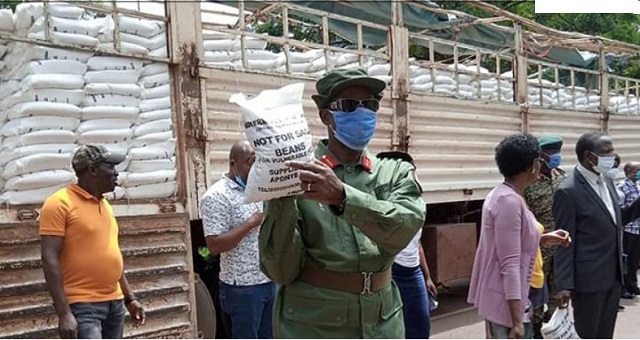
But food insecurity was becoming a political hot potatoe. Museveni’s announcement that the government would distribute 6kg of maize meal, 3kg beans, milk, and salt in Kampala and Wakiso districts got mixed reactions.
Up to 1.5 million households were targeted initially but that was expanded to two million. In an area with about four million people in two districts, the government’s pledge was a major undertaking. It, for example, requires 12,000 tonnes of maize meal for just two districts. Oddly, Museveni also announced help for the two districts with the richest people in the country. Poverty levels here are just 3% on average compared to 21% in the rest of the country.
When asked about this, Museveni said the food distribution was not a poverty alleviation intervention but a means of ensuring that the urban poor; those whose daily hand to mouth cycle was blocked by the lockdown do not starve in their houses. He singled out taxi drivers, boda boda, and petty traders. But the President appeared to be driven by political instinct and not the needs of the poor.
For a start, there is no evidence that taxi operators were the most hard-hit by the lockdown. The President appeared to be targeting food aid to taxi operators because of their long history as his vote churning machines under the Uganda Taxi Operators and Drivers Association (UTODA). Secondly, the President insisted that the posho and beans would be delivered door-door. But there is no evidence that taxi operators and people of that kind live in one locality. It was also illogical to expect that a home without a taxi driver in the same neighbourhood could be skipped during the food distribution.
In any case, according to KCCA planning documents, there are only about 250,000 people working in the biggest city taxi park; the old taxi park. And these include the taxi drivers, conductors, vendors, and small business owners. Kampala has two taxi parks. An earlier study in the journal `Transport News’ put the number of taxis in Kampala at 18,000. If three workers are allowed for each taxi, the total taxi workers would be just 54,000 people.
Scandals erupt
Museveni’s naming of taxi drivers, boda boda and petty traders could have been political rhetoric. The numbers, about 50% of the population in target area, go beyond people who have lost livelihood in the COVID 19 lockdown. If implemented fully, it could cover most of the urban poor who, although they constitute only 3% of the urban population, are mostly unemployed. Up to 44% of these urban poor, aged between 20 to 39 years according to the Uganda Bureau of Statistics (UBOS) figures, are unemployed and food insure even in good times. But they are voters. Unfortunately, the food appears not to be reaching them. The food crisis is puncturing Museveni’s apparent competent handling of the COVID-19 crisis.
A scandal erupted almost as soon as Museveni’s food distribution drive started and it emerged that officials in charge had inflated the cost of the food items. Four top official in the Office of the Prime Minister were soon carted off to jail. Then it emerged that although the President had promised beans, posho, and milk. Only posho was being handed out. When the beans finally came, they were of such poor quality; full of impurities like weevils and stones, they were withdrawn. The supplier is a close associate of Museveni’s inner circle.
In the end, the food is ending up in random homes. Most receivers are happy. After all, rich or poor, beans and posho are on the menu these days. And nothing is better than something free. But some of them mock the exercise, turning it into a comedy. Social media has been awash with images and skits of food distribution related content. Some complain of its quality, others now want government to provide charcoal to cook with, while others want variety. Depending on who you speak to, the food distribution is either a comedy, tragedy, or circus. That should worry politicians come the 2021 elections.
****
CLICK TO READ ONLINE MAGAZINE HERE
 The Independent Uganda: You get the Truth we Pay the Price
The Independent Uganda: You get the Truth we Pay the Price


